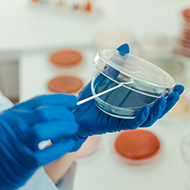Vet-led alliance awarded funding to tackle AMR

The project will develop new treatments and products to reduce the global burden of AMR and infectious diseases.
An RVC-led knowledge exchange programme has received £1.9 million in funding from Research England to tackle infectious disease and antimicrobial resistance (AMR).
The London-Liverpool based alliance ‘The Bloomsbury SET’, aims to accelerate solutions to One Health problems by bringing together the academic and commercial sectors. Starting this July, the year-long project will help commercialise academic research and develop new treatments and products to reduce the global burdens of AMR and infectious diseases.
Among the institutions involved include the London School of Hygiene & Tropical Medicine (LSHTM), SOAS University of London, and the Infection Innovation Consortium (iiCON), led by the Liverpool School of Tropical Medicine.
Professor Richard Bomphrey, interim vice-principal for research at the RVC, said: "There has never been a better time to bring together an outstanding interdisciplinary and inter-sectorial consortium to take on the globally important and pressing issues of infectious disease and antimicrobial resistance. The Bloomsbury SET Impact Connector programme will support innovators as they take promising therapeutics from the laboratory to communities worldwide.”
As part of the project, The Bloomsbury SET’s Impact Connector programme will work with businesses to deliver products vaccines, diagnostics and therapeutics that will benefit both animals and humans.
Among the planned activities include bespoke workshops, peer-to-peer learning, and business mentoring to support product development. There will also be a skills programme for academics to develop their understanding of the concepts required to commercialise academic research.
Dr Hannah Whiteman, head of strategic research at the LSHTM, said: “The Bloomsbury SET Impact Connector programme represents an excellent opportunity to build further links with our regional KE partners at RVC and SOAS, and strengthen our national network through a new partnership with the Infection Innovation Consortium.
"The programme will empower our innovators across career stages with training, funding, and opportunities to forge new external industrial networks and advance their technologies closer to delivering societal and economic impact.”



 The Animal and Plant Health Agency (APHA) has updated its online reporting service for dead wild birds.
The Animal and Plant Health Agency (APHA) has updated its online reporting service for dead wild birds.